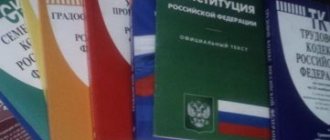- home
- Services
- Civil cases
- Termination of proceedings in civil proceedings
Termination of proceedings in civil proceedings is one way to close the dispute. Moreover, the dispute may end before it even begins if the judge finds out that resolving such a conflict is not within his competence. But if this form of closing a case has already been used, then it will not be possible to reopen it. Participants will have to find another reason to initiate protection of their violated rights through the courts.
Grounds on which a case may be terminated
The Civil Procedure Code of the Russian Federation has a separate article to outline all the grounds on which a judge can dismiss a case. And this is not just the right of the judge, but his duty; if any of the participants or the judge himself declares that there are grounds for dismissing the case, then it will be impossible to avoid it.
The case must be dismissed if:
- The claim must be considered outside the civil process;
- The application is submitted to protect the rights of another person, but the applicant does not have the authority to do so;
- The plaintiff demands to challenge acts that do not affect his interests;
- The dispute between the parties has already been resolved by a court or arbitration tribunal;
- Previously, the court recorded the plaintiff’s refusal of his claims or the conclusion of a settlement agreement;
- The citizen acting as a party to the case has died, or the organization has been liquidated, and succession in disputed legal relations is not allowed.
In procedural legislation, the list of grounds is exhaustive; the article does not contain a rule allowing the termination of a case on other grounds.
What is the arbitration process
The arbitration process is a judicial procedure mainly between business entities on issues related to their commercial activities. Everything related to the course of judicial consideration of this category of disputes is regulated by the Arbitration Procedural Code and is aimed at resolving contradictions that have arisen between business representatives.
An important feature of the arbitration process is that it exclusively considers disputes of an economic nature between an entrepreneur and another entity, provided that the issue concerns commercial activities.
Procedure for terminating proceedings in civil proceedings
Once a claim is submitted to the court, it is reviewed for compliance with the law. The grounds for refusing to accept a claim partially overlap with the grounds for dismissing the case. And if the claim is nevertheless accepted for consideration, because the grounds for refusing to accept it have not been identified, then the case will still not be considered, but this will be done through another procedural action - termination of the case.
It is in the interests of the defendant to find a reason to terminate the consideration; therefore, he can submit a petition to the court, where he will explain in a reasoned manner on the basis of which he demands to terminate the process. A civil lawyer who knows all the intricacies of litigation will help you draw up such a petition.
The judge issues a ruling to terminate proceedings in a civil case. It is interesting that the article on refusal to accept a claim states that a private complaint . In relation to the determination to terminate the case, there is no such clause in the law.
Concept and types of suspension of proceedings
In the current procedural legislation there are two similar concepts, but if they are considered in a legal interpretation, then these are completely different formulations. We are talking about postponement and suspension of production.
Let's find out what their essence is and the difference from each other:
| Postponement of production | · the case is postponed for a specific period, the exact date is known, so there is no obstacle to the progress of the case; · the case is postponed in order to perform certain procedural actions; · the process is initiated in the event of any subjective factors. For example, if one of the witnesses did not appear to testify, etc.; · if the court postpones the case, then a new date for the trial is set at the same time. |
| Suspension of production | · it is impossible to predict when this impact will stop. Therefore, the trial is postponed for an indefinite period, the exact date is not set; · all procedural actions are terminated; · occurs due to circumstances beyond the control of the court and the parties; · to start the process of suspending proceedings, a special court resolution is issued - a ruling. |
If the proceedings have already begun, then it cannot be postponed even for existing reasons. But it is allowed to suspend proceedings at any stage of civil proceedings, from preparation to debate between the parties.
At the legislative level, there are two types of suspension of proceedings:
- mandatory;
- recommended.
Depending on the circumstances, a decision is made to suspend the proceedings.
Exception identified in the course of judicial practice
Sometimes judicial practice runs counter to legal norms. Such cases include the termination of proceedings in a civil proceeding relating to divorce. According to the rules of legal proceedings, spouses are given a month (Article 23 of the Criminal Code), during which they can resolve controversial issues, withdraw the statement of claim, thereby stopping the consideration of the case at the initial stage, until its logical conclusion and a decision.
If reconciliation did not last long, the plaintiff may file a second claim containing essentially the same subject matter and legal grounds. The only difference is the reason for the divorce. The court is obliged to accept the petition, it is subject to consideration in the prescribed manner. If the legislation of the Russian Federation did not provide for the repeated submission of an application to the judicial authority and did not give permission for this action, it would not comply with the principles of the law of a democratic state, declaring the lack of freedom of choice among citizens.
Actions of a procedural nature, regulated, in particular, by the chapters and articles of the Code of Civil Procedure of the Russian Federation, contain many nuances. Murzakova E.M. will provide qualified assistance to citizens who are interested in such issues as termination of proceedings in civil proceedings. It is extremely difficult for a person without a legal education to understand the intricacies on his own. A call to 8 (495) 505-24-50 will help clarify the situation.
Return to Civil Cases section
General provisions on suspension of criminal proceedings
According to Article 6.1 of the Code of Criminal Procedure of the Russian Federation, the period of criminal proceedings, which includes the period of investigation and the time of trial, must be reasonable. This article of the procedural law reflects the constitutional right of a person to judicial protection without unreasonably delaying the procedure for establishing the truth, the right of a victim of criminal acts to restore social justice. The norm quite clearly defines the priorities for the duration of the investigation and consideration of the case: in strict accordance with the special articles of the Code of Criminal Procedure of the Russian Federation, establishing time limits.
For example , the period of preliminary investigation, in accordance with the rules of Art. 162 of the Code of Criminal Procedure of the Russian Federation is 2 months. Then it is possible to extend it for a number of reasons by the heads of investigative bodies at various levels up to 12 months , and beyond - in exceptional cases by the Chairman of the Investigative Committee of Russia. During this period, the investigator is obliged to solve the crime, find the perpetrators and bring charges against them, having obtained all the evidence.
It is no secret that not all crimes are solved during the year, and the culprit is not always identified. Some crimes, the so-called “penalties”, remain unsolved forever, the investigation into them is suspended, and the period from the moment of suspension is not included in the total period of the investigation. Most often, the impossibility of an investigation is due precisely to the failure to identify the person who committed the criminal act.
As for the duration of judicial consideration, the Code of Criminal Procedure of the Russian Federation does not establish a specific period for consideration of a criminal case by a judge , but the same Art. 6.1 of the Code of Criminal Procedure of the Russian Federation focuses on reasonableness in this matter. Therefore, the judge, as well as the investigator, has the right to suspend the case by his decision if there are obstacles to the consideration - based on judicial practice, most often they are the inability of the defendant to participate in the process (for example, due to a long and serious illness).
Thus, according to current legislation, a criminal case can be suspended both at the stage of investigation (inquiry) and at the stage of trial.
From the date of the relevant decision, no investigative actions or hearings are temporarily held in the case. At the same time, some extra-procedural investigative activities, if we are talking about the pre-trial stage, are still carried out. It is necessary to establish the location of the suspect and stolen property, establish the social circle of the escaped person, etc. That is, work is being done to remove obstacles to continuing the investigation.
Usually the investigator does not know for what period the work on solving the crime is interrupted - this time is uncertain and can last quite a long time. At the same time, the suspension order is not the final document that “closes” the case . Rather, it is an interim decision that can be canceled at any time. However, sometimes the investigation is never resumed, and the case is closed due to the expiration of the statute of limitations.
The suspension of a case in court is almost always canceled, since the obstacles to the process are usually removable. The exception is if the defendant fled and will never be found. Such cases are isolated in nature, since the identity of the accused has already been established during the consideration of the case, which facilitates the task of identifying traces of his movement. After a wanted person is declared, finding the fugitive is a matter of time.
The criminal procedure legislation provides for grounds for suspending criminal proceedings in two different chapters of the Code of Criminal Procedure of the Russian Federation: for the investigation stage and for the judicial review stage, separately.
Commentary on Article 215 of the Code of Civil Procedure of the Russian Federation
1. Judicial proceedings are carried out in the form of a court session, but the case cannot always be considered in one court session. The reasons for this may be various circumstances that become obstacles to procedural actions. The emergence and overcoming (elimination) of some obstacles depends on the actions of the participants in the civil process, the existence and elimination of others is not connected with their expression of will. Removing obstacles that arise may also require varying amounts of time.
The current Code of Civil Procedure contains forms of the court's response to obstacles to the consideration of a case that arise in the judicial process. In particular, the court may temporarily suspend the performance of procedural actions during the trial. Suspension of proceedings in a case is an indefinite termination of all procedural actions of the court, caused by objective reasons (independent of the will of the court and persons participating in the case), the specific duration of which cannot be determined.
The distinction between the adjournment of a case (see commentary to Article 169 of the Code of Civil Procedure) and the suspension of proceedings can be made according to the following criteria: on grounds - circumstances, the occurrence of which is associated with the possibility of applying the norms of a particular institution; according to the period of temporary suspension of procedural actions; according to procedural consequences.
The grounds for suspending proceedings in a case are expressly indicated in the law and are divided into two groups: the commented article lists the grounds for suspending proceedings in a case that are obligatory for the court; in Art. 216 of the Code of Civil Procedure are optional grounds, the application of which depends on the discretion of the court itself. The list of grounds for suspending proceedings in any of the above cases is closed and is not subject to broad interpretation.
When suspending proceedings in a case, the period for stopping procedural actions does not depend either on the discretion of the court or on the wishes of other participants in the process, since the grounds for suspending proceedings on the case are objective circumstances. The possibility of resuming proceedings in a case is associated by law with the disappearance of the circumstances that served as the basis for its suspension (see commentary to Article 217 of the Code of Civil Procedure). Naturally, when making a ruling to suspend proceedings in a case, the judge cannot predict the exact time when the above circumstances will cease. When postponing proceedings in a case, the period of temporary suspension of procedural actions in the case is always precisely determined by the court, i.e. the date and time of the next court hearing are indicated, of which all persons participating in the case are notified in the manner prescribed by current legislation. Thus, the period for which the trial is postponed refers to the procedural deadlines assigned by the court (judge), but its limit parameters are not established in the Civil Procedure Code.
Suspension of proceedings in a case entails suspension of all procedural deadlines. Part 1 art. 110 of the Code of Civil Procedure establishes that the course of all unexpired procedural deadlines is suspended simultaneously with the suspension of the proceedings. From the day the proceedings are resumed, the procedural deadlines continue (Part 2 of Article 110 of the Code of Civil Procedure). When adjourned, procedural deadlines are not suspended, but continue to run, including the general deadline established by law for consideration of the case in the appropriate instance.
Both procedural institutions require a temporary suspension of all procedural actions. However, both the suspension of the proceedings and the postponement of the hearing of the case do not exclude the possibility of implementing at this time the institutions of securing a claim and securing evidence.
After the adjournment of the case, the proceedings begin from the very beginning (Part 3 of Article 169 of the Code of Civil Procedure), at the same time Part 4 of Art. 169, due to the principle of procedural economy, presupposes the possibility, under conditions determined by law, to confirm previously given explanations to the participants in the process without repeating them.
The consequences of suspension of proceedings in a case by the legislator, unfortunately, are not clearly defined, except in the case of suspension of proceedings in a case in connection with procedural succession (see commentary to Part 2 of Article 44 of the Code of Civil Procedure). In practice, if the period from the moment of suspension of the proceedings to its resumption is long, taking into account the principle of immediacy, it is advisable to repeat the consideration of the case from the very beginning, since during this time the participants in the process can not only change their position on the case, but also forget everything previously said and explored in this process. The interpretation of the rules of judicial proceedings in Ch. 15 of the Code of Civil Procedure, which does not contain rules allowing participants to refer to evidence previously examined in another court session without re-examining it, except in cases of adjournment of the trial.
Proceedings in the case, if there are grounds specified in the law, may be suspended when considering the case not only in the court of first instance, but also in any other court (see, for example, the commentary to Article 44 of the Code of Civil Procedure, which allows for the possibility of procedural succession at any stage of the civil process, which is a mandatory basis for suspending the proceedings by virtue of paragraph 2 of the commented article). According to the current Code of Civil Procedure, it is also possible to suspend proceedings in a case at a preliminary court hearing. This is directly stated in Parts 4 and 5 of Art. 152 Code of Civil Procedure. The suspension of the proceedings in these cases is also formalized by issuing a court ruling, which can be appealed (see commentary to Part 5 of Article 152 of the Code of Civil Procedure).
The suspension of enforcement proceedings is also carried out by the court, but according to the rules of Section. VII Civil Procedure Code. At the same time, the grounds for mandatory suspension of enforcement proceedings (see commentary to Article 438 of the Code of Civil Procedure) and optional grounds (see commentary to Article 437 of the Code of Civil Procedure) are practically similar to the grounds for suspension of proceedings in the case specified in the commented article and Art. 216 Code of Civil Procedure, respectively. Other procedural issues related to the suspension of enforcement proceedings (timing, consequences, renewal, etc.) are resolved in a similar way.
The list and content of the grounds for suspending the proceedings listed in the commented article have undergone some changes and clarifications in comparison with the previously valid Code of Civil Procedure. The question of the existence of grounds and the need to suspend the proceedings may be raised at the initiative of the participants in the civil process or independently by the court if it has become aware of these circumstances.
2. In para. 2 of the commented article contains only the general term “party”, therefore, the circumstances specified in this paragraph may serve as grounds for a mandatory suspension of the proceedings if they arose or apply to both the plaintiff and the defendant in the case. In contrast to the previous law, the new Code of Civil Procedure directly establishes the need to suspend the proceedings in the case of the occurrence of the circumstances specified in paragraph. 2 of the commented article, in relation to third parties making independent claims regarding the subject of the dispute.
Paragraph 2 of the commented article establishes as a mandatory basis the death of a citizen, the reorganization <1> of a legal entity, if these cases allow for succession, i.e. transfer of material rights and obligations from a party to the case or from a third party making independent claims regarding the subject of the dispute to the legal successor. Otherwise, if the disputed legal relationship does not allow succession, then the proceedings are subject to termination by virtue of paragraph. 7 tbsp. 220 Code of Civil Procedure (see commentary to Article 220 Code of Civil Procedure). In these cases, it is necessary to distinguish between reorganization (Articles 58 - 60 of the Civil Code) and liquidation of a legal entity - the latter does not allow succession, however, during liquidation, a special procedure established by law for satisfying the claims of creditors (Article 64 of the Civil Code) applies.
——————————— <1> In paragraph 1 of Art. 214 of the Code of Civil Procedure of the RSFSR contained the wording “cessation of the existence of a legal entity,” which necessitated the interpretation of this wording from the point of view of the essence of the institution of suspension of proceedings.
The conclusion about the possibility of legal succession in the disputed legal relationship under consideration is made by the court on the basis of the rules of substantive law and the evidence presented by the parties of the possibility of transfer of rights and obligations, which can, for example, be: documents confirming the death of a citizen or recognition of him as deceased, as well as the presence of heirs ready to enter into an inheritance; decision of the relevant authorities on the reorganization of a legal entity, transfer acts, constituent documents of the reorganized entity, etc.
The commented article talks about procedural succession, which is possible on material grounds (grounds specified in the current civil legislation) only after the initiation of a civil case. Otherwise (if the succession occurred before the initiation of civil proceedings), there are no grounds for suspending the proceedings in the case and the court resolves the issue of the possibility of replacing an inappropriate defendant at the appropriate stages of the civil procedure (see commentary to Article 41 of the Civil Procedure Code) or takes this circumstance into account when issuing a judicial decision act.
In addition, succession on other material grounds (assignment of the right of claim, transfer of debt) does not entail the consequences specified in the commented article, since in these cases the replacement of a person both in the material legal relationship and in the process occurs simultaneously or the court may postpone the trial of the case for short period of time.
3. In para. 3 of the commented article clarifies the wording of a party’s loss of legal capacity - a mandatory basis for suspending proceedings in a case. This situation may be caused in practice by the loss of legal capacity of a party to the case, which is only an individual, since the legal capacity of a legal entity is inextricably linked with its legal capacity. Loss of legal capacity entails loss of legal capacity, which deprives a legal entity of the opportunity to be a participant in civil procedural legal relations. In this case, we can talk about either liquidation or reorganization of a legal entity, but not about its loss of legal capacity. The consequences of such actions are indicated in paragraph 2 of this commentary.
A citizen is recognized as incompetent or partially capable in accordance with the procedure established by law (see commentary to Chapter 31 of the Code of Civil Procedure).
Due to the fact that recognition of a citizen as having limited legal capacity or incapacity is established in a special proceeding only on the basis of a court decision, the basis for suspending the proceedings in the case will be a court decision recognizing the citizen as incompetent or partially capable. Partial restriction of legal capacity can serve as a basis for suspending proceedings only in cases where the dispute under consideration concerns property rights in respect of which the citizen is recognized as having limited legal capacity.
In accordance with Art. 285 of the Code of Civil Procedure, a court decision to recognize a citizen as incompetent or with limited legal capacity by the guardianship and trusteeship body is the basis for appointing a guardian or trustee to the person. If this does not happen, then this circumstance is also a mandatory basis for suspending the proceedings.
The initiation of proceedings on the recognition of a citizen who is a party to the case during the consideration of the case as incompetent or partially capable entails the consequences established by paragraph. 5 of the commented article. Thus, this circumstance constitutes another basis for the mandatory suspension of the proceedings.
4. The fourth paragraph of the commented article establishes as a mandatory basis for suspending the proceedings the participation of the defendant in hostilities, performing tasks in conditions of emergency and martial law, as well as in military conflicts. If the plaintiff is in a similar position, then in order to suspend the proceedings, the court must receive from him or his representative a request for this in the form of a petition or statement. Despite the fact that the law contains the wording “request of the plaintiff,” the court, upon receipt of this request, cannot refuse to satisfy it if it is supported by documentary evidence.
To carry out the actions specified in the commented paragraph, the party must have the appropriate status (military personnel, employees of internal affairs bodies, prosecutors, etc.) or they must be subject to the relevant laws <1>. Otherwise, the facts under consideration cannot be grounds for suspending the proceedings.
——————————— <1> See, for example, Federal Constitutional Laws of May 30, 2001 N 3-FKZ “On State of Emergency”, dated January 30, 2002 N 1-FKZ “On martial law”, Decree of the Government of the Russian Federation of March 31, 1994 N 280 “On the procedure for establishing the fact that military personnel and other persons have performed tasks in a state of emergency and during armed conflicts and providing them with additional guarantees and compensation.”
5. One of the mandatory grounds for suspending proceedings in a case by virtue of paragraph. 5 of the commented article is the impossibility of considering a case before a decision is made on another case or issue being considered in civil, criminal or administrative proceedings. In this regard, this norm corresponds to Art. 118 of the Constitution of the Russian Federation. The facts considered in other civil, criminal or administrative proceedings must be relevant to the civil process that is subject to stay. In addition, these facts will have prejudicial significance in matters of circumstances established by the court in relation to persons participating in both proceedings.
In contrast to the current APC, in the Civil Procedure Code the obligation to suspend proceedings in a case by the court is made dependent on the type of legal proceedings, and not on the jurisdictional body that has jurisdiction over the consideration of the case. The current Civil Procedure Code, unlike the Arbitration Procedure Code, does not say anything about the consideration of a case in the constitutional (statutory) court of a constituent entity of the Russian Federation as a mandatory basis for suspending the proceedings.
It is necessary to distinguish between the suspension of proceedings in accordance with paragraph. 5 of the commented article from leaving the application without consideration (see paragraph 5 of Article 222 of the Code of Civil Procedure). Despite the external similarity, the norms of the latter institution are applied if there is a previously initiated case in the proceedings regarding a dispute between the same parties, on the same subject and on the same grounds, i.e. identical case is being considered.
6. Established in paragraph. 6 of the commented article, the mandatory basis for suspending the proceedings in the case corresponds to Art. 103 of the Federal Constitutional Law of July 21, 1994 N 1-FKZ “On the Constitutional Court of the Russian Federation” <1>, which establishes that in the period from the moment the court makes a decision to appeal to the Constitutional Court of the Russian Federation and until the adoption of the decision of the Constitutional Court of the Russian Federation, the proceedings in the case or the execution of the decision made by the court in the case is suspended.
——————————— <1> NW RF. 1994. N 13. Art. 1447.
When establishing the need to verify the compliance of the law to be applied with the Constitution of the Russian Federation, the court must issue a reasoned ruling on this. A request to the Constitutional Court of the Russian Federation is drawn up in the form of a separate document (clause 3 of the Resolution of the Plenum of the Supreme Court of the Russian Federation of October 31, 1995 No. 8 “On some issues of the application by courts of the Constitution of the Russian Federation in the administration of justice”) <1>. The request must comply with the requirements established in Art. Art. 37, 38 of the Federal Constitutional Law “On the Constitutional Court of the Russian Federation”.
——————————— <1> BVS of the Russian Federation. 1996. N 1.








